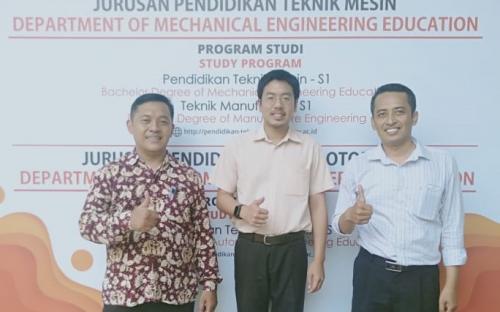- Alamat : Kampus Karangmalang, Yogyakarta, 55281
- Telp. (0274) 586168 psw. 1216,1276,1289,1292 (0274) 586734 Fax. (0274) 586734
- Help Desk (WhatsApp) : 0895-2919-9119 (Jam Kerja 07.30 - 16.00 WIB)
- website : http://ft.uny.ac.id
- e-mail: ft@uny.ac.id
You are here
BIOMASS ENERGY DEVELOPMENT WITH Dr. Eng. CHINNATHAN AREEPRASERT
The Faculty of Engineering of Yogyakarta State University carries out a collaboration with Kasetsart University. This was marked by the implementation of the Guest Lecture by Dr. Eng. Chinnathan Areeprasert from the Department of Mechanical Engineering, Faculty of Engineering, Kasetsart University, Thailand (22-24 / 01/2022). While at the Faculty of Engineering, Yogyakarta State University, Dr. Eng. Chinnathan Areeprasert was a guest speaker at the generale stadium attended by students of Mechanical Engineering and Manufacturing Engineering Education.
In his presentation, he explained "the Technology of Waste Biomass Technology for Value-added Green Products". Biomass energy is one alternative for processing biomass (especially plant and animal waste) into fuel energy.
According to Dr. Eng. Chinnathan Areeprasert, Enegri Biomass is considered as one of the best solutions to convert waste biomass into environmentally friendly products and have economic value. "Utilization of biomass waste as a potential source of fuel has even been recognized globally," he said.
This fuel can be used by all sectors of society for electricity production, transportation fuel, heating and cooling sources, and industrial processes. This process not only completes waste disposal but also produces enormous economic and environmental benefits.
"This system has proven to be a promising alternative because it is renewable, sustainable and environmentally friendly, although of course there are challenges in the process of converting and utilizing waste so that it can become an efficient energy source," he continued.
Besides giving lectures, Dr. Eng. Chinnathan Areepraser will also conduct collaborative research with a lecturer in Mechanical Engineering Education, Yogyakarta State University, Dr. Freddy Surahmanto, M. Eng., They have agreed to collaborate on the research theme Waste and Biomass Conversion into Value-added Products by Hydrothermal Technology.
Dr. Freddy stated that this collaboration had been finalized in the Implementation Agreement with a duration of around 2 years. "Of course this research will begin with conceptualization until later on the preparation of the report and dissemination," he said. (Steven)
Bagian dan Sub Bagian
Link Journal
Kontak Kami
Copyright © 2024,

